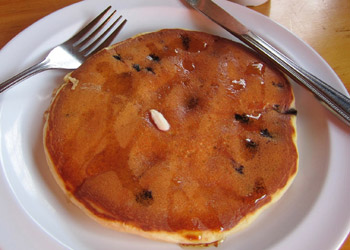More than once every winter, all Massachusetts residents ask themselves, Why do I live in New England?
The answer, although unclear in the depths of January, is that following every bitter winter comes a rejuvenating spring, and the first signs of that natural wonder are the sap buckets adorning the maple trees.
Fed up after scraping snow and ice from my windshield late into March, I decided to take the task of forcing spring into my own hands and indulge my taste for seasonal treats at a traditional Western Massachusetts sugar house and pancake restaurant.
Massachusetts is the sixth largest syrup-producing state in the nation, with 80 percent of its syrup production located west of the I-91 corridor. Of the 350 maple syrup producers at my disposal, I chose to shed my wintry blues at the Williams Farm Sugarhouse near the Pocumtuck Mountains in Deerfield, the current home of a business that has been run by the Williams family since 1853.
I could spot the cloud of sugary maple goodness steaming from the roof as I was driving up Route 10. The smell of sap being transformed into syrup was immediately detectable as I stepped out of the car. The sweet aroma was alluring as I walked into the quaint post-and-beam establishment with benches and tables flanking a wood furnace.
The Williams Farm Sugarhouse menu is devised to satisfy the gamut of breakfast cravings, offering everything from plain and blueberry pancakes to French toast and Belgian waffles with blueberries, strawberries or hot apples and whipped cream. (Ingredients such as milk, eggs and bread are sourced from other local farms, reinforcing the emphasis on farm-to-table consumption that is strong in the Valley.) Side orders included maple-frosted doughnuts, toast with maple cream and the expected sausage or bacon. The waffle sundae with hot fudge sounded tempting but too imprudent for a modest Sunday breakfast.
After placing my order, I ventured inside the maple syrup laboratory. Observing the giant bath of boiling sap and the tedious drip-method production of the syrup made me realize how dedicated Western Massachusetts maple tree farmers are to their products. Forty to 50 gallons of sap make only one gallon of syrup, and the process requires most farmers to boil through the night. The Williams family creates a product that is light, natural and good for the seasoned New England soul. Their sap collection method uses a tubing pipeline system that feeds the sap into an evaporator. There the 2 percent sugar concentration is boiled down at 219 degrees to the proper density.
After a short wait, my order was ready. It consisted of one very large blueberry pancake and coffee (with unlimited refills) on a tray adorned with a tall squeeze bottle of Williams’ homemade maple syrup. Its color was amber brown, its consistency was thick yet fluid, and the taste was refreshing and sweet. The pancake was fluffy and extremely filling, and the combination of the blueberry and maple syrup flavors had a wonderful melt-in-your-mouth quality that left me eager to go back for more.
Overall, my trip to Williams Farm Sugarhouse was cozy and relaxing. Although it was only 48 degrees when I left, I was reassured that the time when forsythia would burst into bloom was right around the corner.
Boiling season is winding down at Williams Farm and other Valley sugarhouses, but maple products are available all year. To order, call 413-773-5186.



